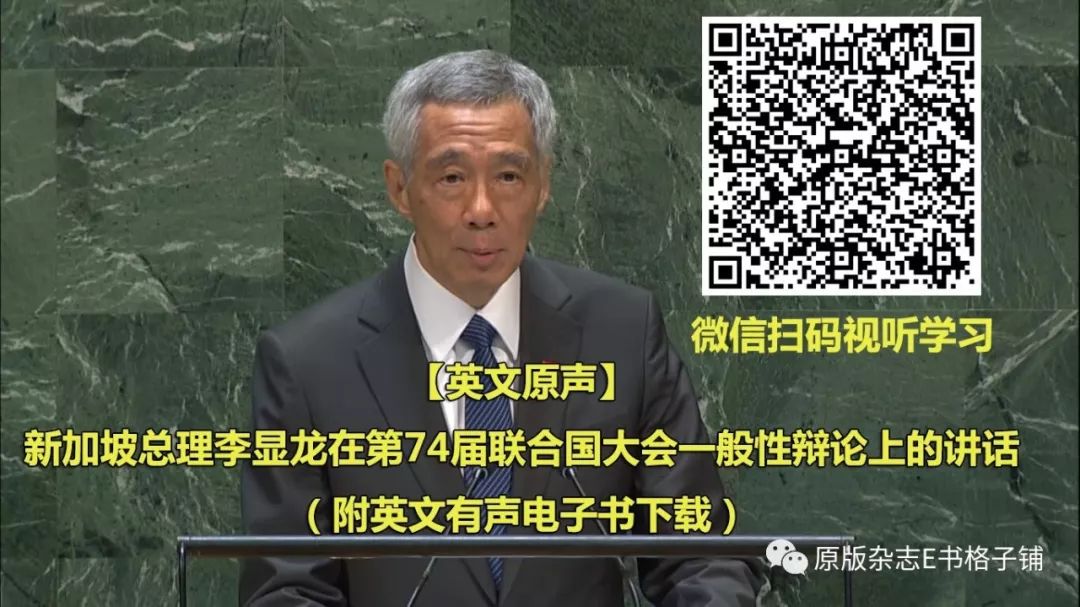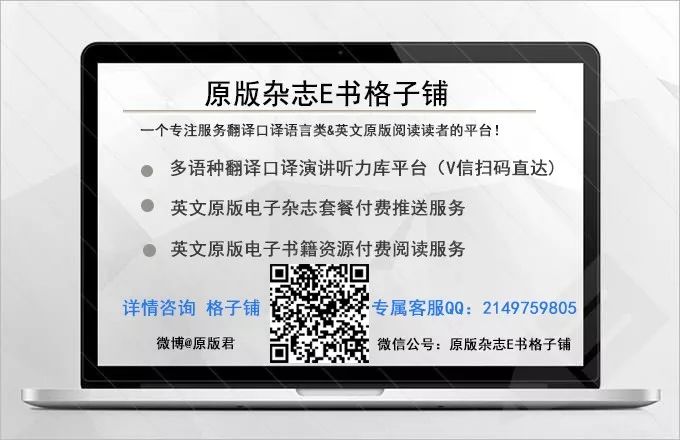李顯龍聯大演講 來自原版雜志E書格子鋪 00:00 12:58
獲取視頻,請點擊文末閱讀原文
獲取有聲電子書,請移步文末最後一行
Multilateralism For A World in Transition
Mr President,
As we approach the 75th anniversary of the United Nations next year, it is timely to reflect on the role of the UN and the relevance of multilateralism.
The open and integrated international order that emerged after the Cold War has benefited all countries. For small countries like Singapore, multilateral institutions, systems and laws are critical for our survival. These give us a stake in the global commons, and a means to defend and advance our interests. A rules-based system imposes responsibilities on all countries, and creates a stable environment for all. This is why Singapore is a staunch advocate of the UN, international law, and of the multilateral system.
Now the world is going through a complex transition. The strategic balance is shifting. More countries are keen to enhance their international roles, and are competing fiercely for influence. At the same time, the global consensus on the benefits of globalisation has eroded and support for multilateralism has declined. In many countries, nationalist, isolationist, and protectionist sentiments have intensified. These sentiments have reshaped their domestic politics, and given rise to inward-looking and nativist policies. The result is a more polarised world.
Continuing along this path will lead to an even more fragmented and unstable world. And yet despite the increased friction and greater potential for conflict, countries have in fact become much more interconnected. Actions by one country are having a greater and faster impact on others, and effects that may eventually rebound upon themselves. In such a world, a multilateral approach is not an option but a necessity, to deal with complex global problems including poverty eradication, pandemics, and climate change. These are some of the themes of this year’s UNGA debate.
Sustainable development has become a priority for all countries. We all face common challenges: creating jobs, raising standards of living and eradicating poverty. But it is very difficult for any country to develop and progress on its own. Growth requires trade, investments, and technology. All these activities depend on working with others, within an open and orderly international framework of rules.
That has been how many countries have progressed in the last 70 years, since World War II. Developed countries opened up their own markets. In return, they benefited from access to new markets in the developing world for their industrial products such as aircraft, electronic devices and machine tools. China’s accession to the World Trade Organisation in 2001 presaged two decades of dramatic economic growth, which lifted more than 850 million people out of poverty. India too has grown steadily since the 1990s, as its economy gradually liberalised, and became more enmeshed with its partners. Earlier, other smaller economies in East and Southeast Asia, including Singapore, travelled this same path.
Now many developing countries in Africa and Latin America are making the same journey. But if global markets become less open, and conditions for trade and investment become more uncertain and disorderly, their progress will become much harder. Traditionally, developed countries help developing countries through foreign aid and technical assistance. But a much more effective way to help them is for developed countries to keep trade and markets open, so that the developing countries become more productive, and can uplift standards of living on their own, providing good jobs at home, without the pressure to emigrate to seek better lives elsewhere.
Today, there is a strong pushback against an open, integrated global economy. The view that globalisation and free trade have worsened inequality has grown. But in truth globalisation and free trade have improved the lives of billions of people around the world, and not only those living in poor countries. Indeed, within each country, there have been winners and losers. Not all countries have succeeded in squaring off the benefits and costs of globalisation domestically. Then the international system often becomes the scapegoat. But a fragmented world with less growth and prosperity will create fewer jobs, and make everyone’s prospects even dimmer. Worse, closed global markets will create tension and instability in the international system.
This does not mean the multilateral system is working perfectly – far from it. The post-war multilateral institutions have serious weaknesses. For example, the WTO has found it increasingly difficult to reach meaningful trade agreements, when any deal requires full consensus among its 164 member countries with hugely diverse interests and philosophies. Furthermore, the WTO’s rules were designed for an agriculture and manufacturing-based world economy, and we now need new and better rules for services, particularly for digital services and intellectual property. But the solution should be to reform these institutions, rather than to bypass or dispense with them, without first putting in place a better answer.
However, countries cannot afford to wait indefinitely for these reforms either. Meanwhile, new regional mechanisms and frameworks for cooperation are emerging or have developed. For instance, the Comprehensive and Progressive Agreement for the Trans-Pacific Partnership, the CPTPP, and the Regional Comprehensive Economic Partnership, the RCEP. These will lower barriers and raise standards for trade in goods and services. For finance, the Chiang Mai Initiative helps Asian countries to manage short-term liquidity problems via a multilateral currency swap arrangement, and complements support from the IMF. These are practical ways for countries to work together to help one another through the vagaries of the global economy.
Infrastructure development is another area ripe for regional cooperation. All over Asia, the demand for infrastructure far outstrips supply. Most of the time, governments cannot fund all the infrastructure they need. International financial institutions like the World Bank and the Asian Development Bank do not have enough resources to go around either. That is why new initiatives like the Asian Infrastructure Investment Bank, the AIIB, or the US’ BUILD Act have a role, and are welcomed by many countries.
These regional or plurilateral arrangements may be second best to multilateral ones, but in an imperfect world they address real needs, and help us progress step by step. The key is to keep these arrangements open and inclusive, so that the arrangements can overlap and add to one another, and allow other countries to join when they are ready. We need to avoid creating rival economic blocs or a bifurcated global economy, forcing countries to choose sides and undermining the international order.
Multilateral cooperation is also essential to deal with “wicked” global problems. These are problems that no single country can solve alone, but which, if not tackled, will have disastrous consequences for all countries.
One salient example is climate change. This is an issue that our young people are seized with, and rightfully so because it is about their futures during their lifetimes. This week, hundreds of thousands of young people demonstrated peacefully all over the world, including in Singapore, to demand climate action from their leaders. We owe them a responsibility to act, and they deserve our full support.
On our part, Singapore takes climate change very seriously. Climate change is an existential issue for us. Like other low-lying island states, we are most vulnerable to rising sea levels. But we will suffer from its other effects too, whether it is new diseases, more extreme weather events, food shortages, forced migration, or even wars.
Being so small, Singapore contributes only 0.11 per cent of global CO2 emissions. Furthermore, we are disadvantaged in alternative energy, with limited sources of renewables, other than solar energy. Nevertheless, we are committed to do our full share under the Paris Agreement to reduce emissions and mitigate global warming. We have implemented significant measures, including a carbon tax, which is the first in Southeast Asia, and which we apply economy-wide with no exemptions.
We are working with the UN to offer technical assistance to other countries. We will collaborate with partners to improve our understanding of climate change and its impact, through research and institutions like the ASEAN Specialised Meteorological Centre, which is based in Singapore. We will also contribute to efforts by international organisations such as the International Civil Aviation Organisation and International Maritime Organisation to reduce emissions. In this regard, I would like to commend the UN Secretary-General for convening the Climate Action Summit this week; it was both timely and necessary.
Most importantly, we have to inculcate in our populations the mindset that each one of us has a responsibility to live sustainably and in harmony with the environment. We are under no illusions that the Paris Agreement target of 1.5 degrees Celsius of global warming or less will be easy to achieve. And even if we do make it, the problem will not be completely solved, because that will only slow down the rise in sea levels, but will not stop it. But we must try our best, and over time, all countries will have to do more to mitigate climate change.
At the same time, we must be serious about preparing early to adapt to climate change. Adaptation efforts will be costly, but they are an essential investment to protect not just our coastlines, but also our communities, our futures, and our very existence. It is the responsibility of our generation to leave future generations with a habitable planet, both through mitigation and adaptation.
Conclusion
To adapt multilateralism for today’s world calls for new approaches that are open, inclusive, and transparent. As member states of the UN, we all have to work together to find solutions to global problems, and build support for multilateral institutions amongst our people. A rules-based multilateral system is still far preferable to any other way to secure peace and prosperity, and to solve global problems. I call on my fellow UN Member States to support the multilateral approach, to push harder against the tide, and demonstrate leadership in this endeavour.
往期推送精選:(成爲我們的VIP書籍群會員會享受終身原版英文書籍推送哦!)
DK出版《English for Everyone: English Grammar & Vocabulary Builder》
DK出版10月新書:《StarFinder for Beginners: Maggie Aderin》(附下載,適合8-10歲)
DK出版社原版書《Evolution (DK Eyewitness Books)》
DK系列百科套書之:The Literature Book(之前已推送哲學,心理學,商學,宗教,科學,莎士比亞等)
DK系列6本百科套書(含哲學,心理學,商學,宗教,科學,莎士比亞)(整套需加付費群獲取)
DK出版社健康類:《First Aid Fast for Babies and Children》
2017版DK可視化原版詞典《Ultimate Visual Dictionary》
原版書:DK 兒童動物百科《findout! Dinosaurs》
DK Readers系列:DK Readers L2: Wild Baby Animals
DK系列原版書5本,入群盡享(免費分享其中一本)
【DK出版】時尚曆史 Fashion: The Definitive History of Costume and Style
關于原版雜志E書格子鋪
原版雜志E書格子鋪 自2015年年初開始就一直致力于服務廣大讀者,分享最新最全最熱門的英美雜志報刊及原版書籍,英語翻譯口譯資料!同時也提供電子雜志報刊付費推送服務!
跟著原版君,閱讀原版雜志書籍,體會不一樣的學習生活!
請掃碼關注微信公衆號:Magazinebook8,或者
新浪微博:@原版君
鏈接: https://pan.baidu.com/s/1jptN8Af8_4xo2uvmjJbLYA 提取碼: yirr 複制這段內容後打開百度網盤手機App,操作更方便哦


